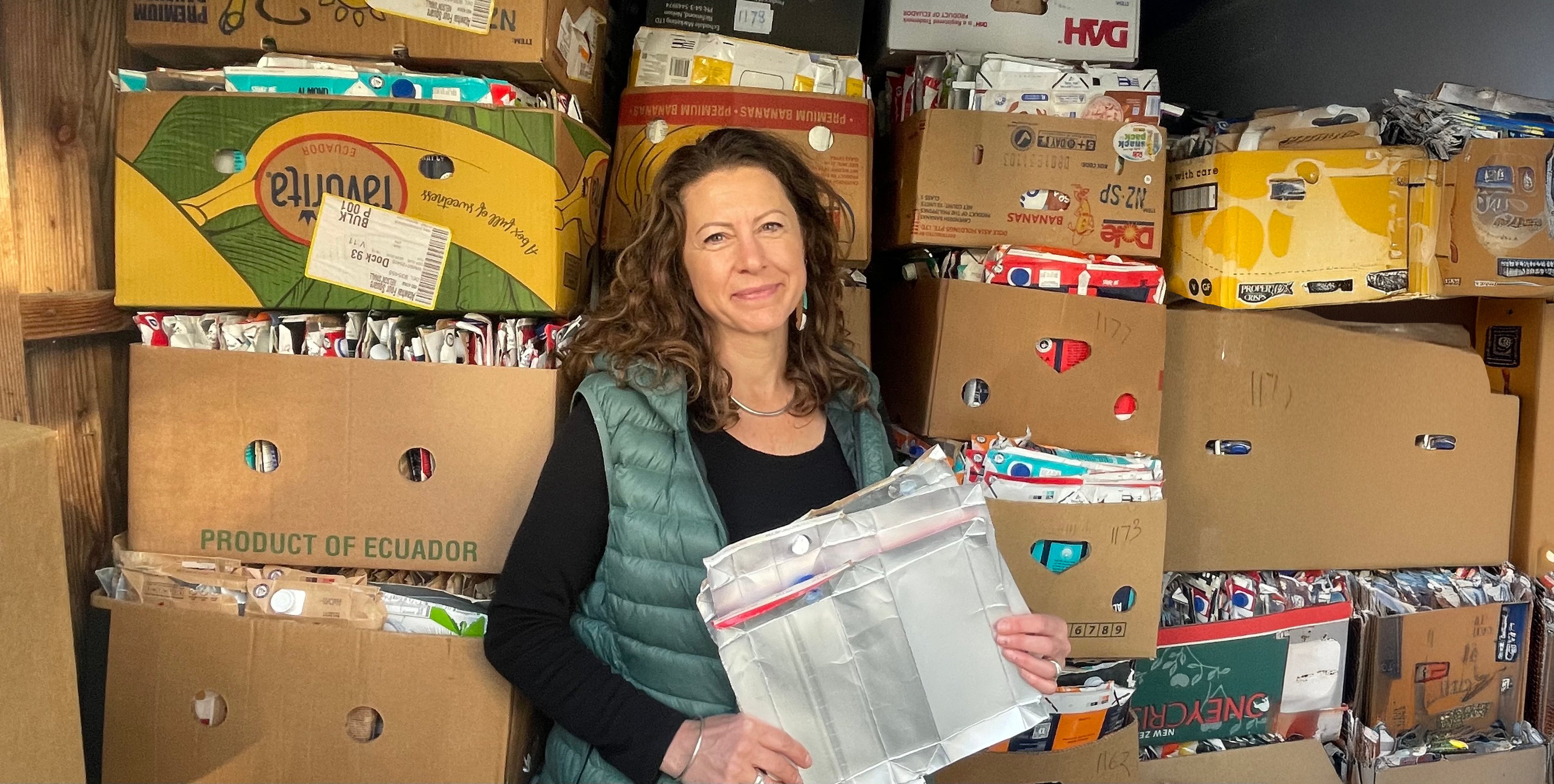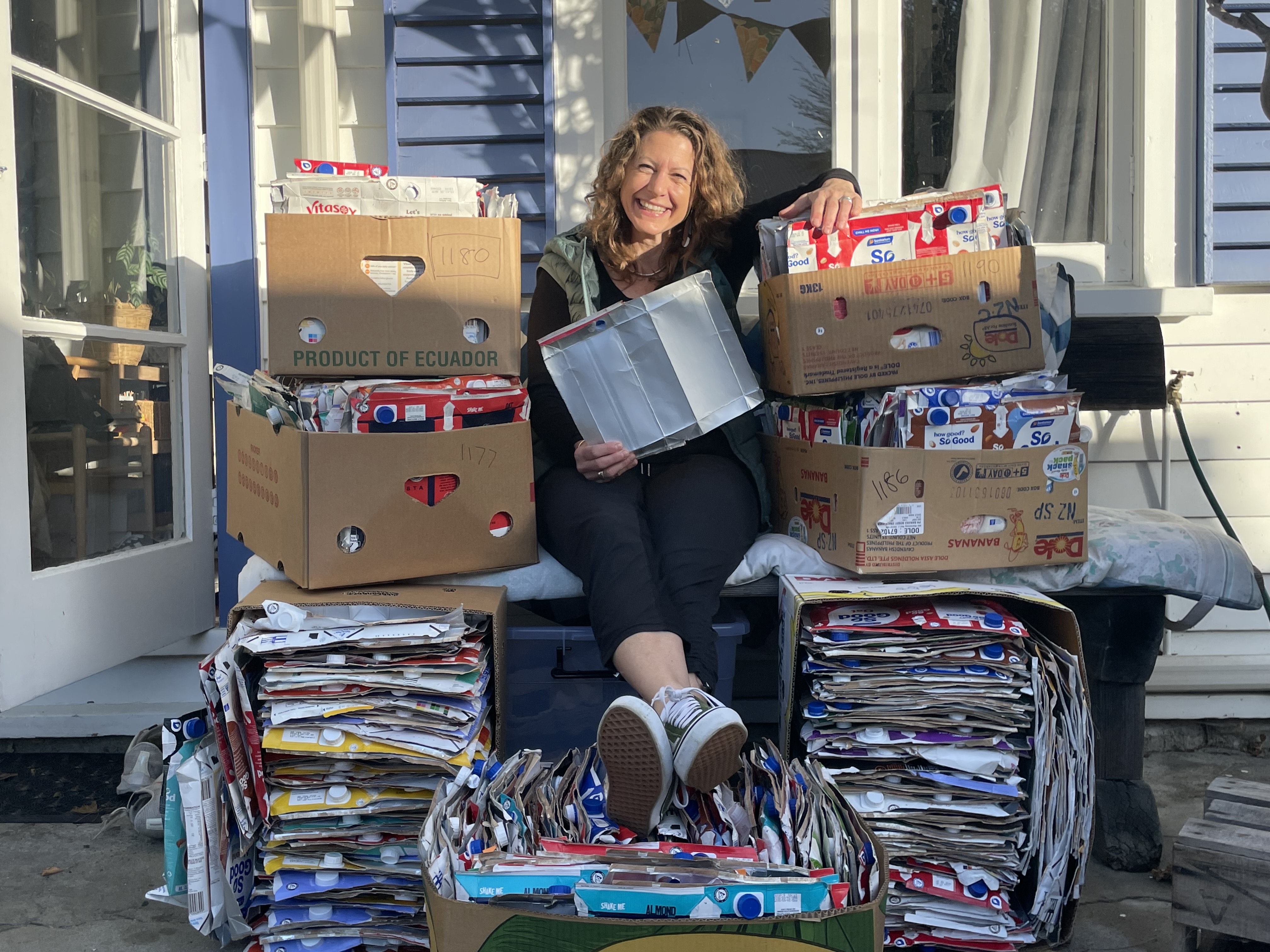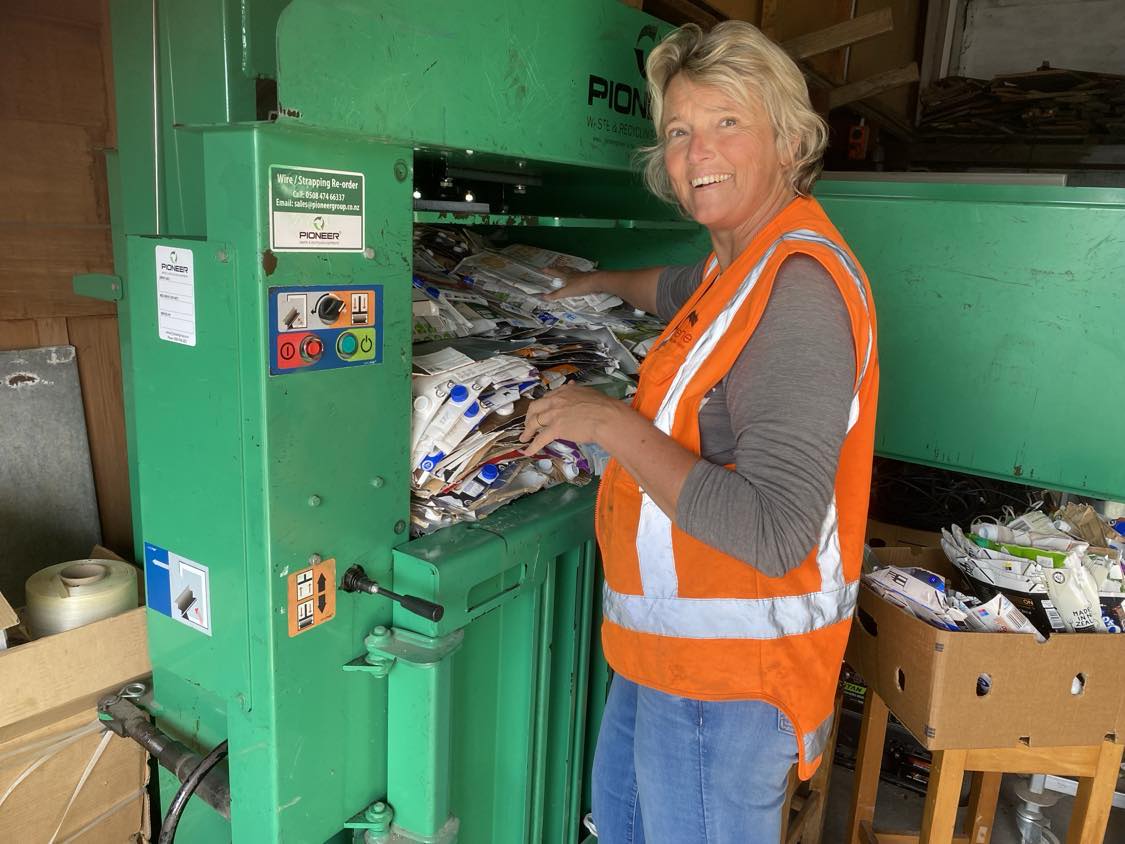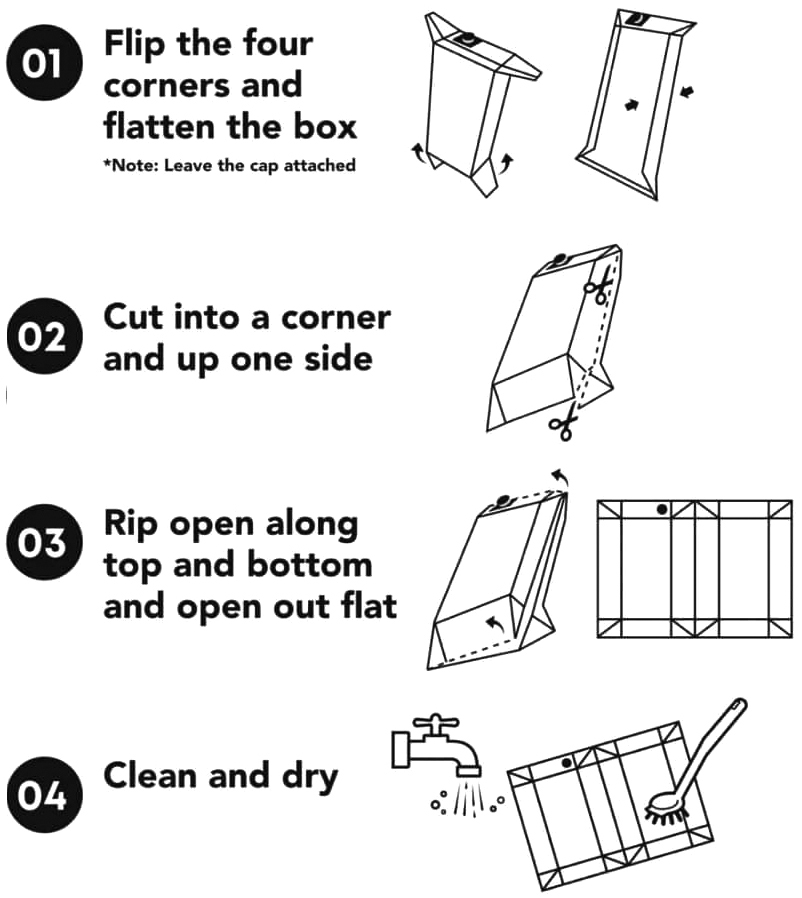Grassroots to greatness

Jemima Jones is reshaping recycling – giving food and drink cartons a second life through community effort.
In a humble Nelson woodshed, Jemima Jones is quietly leading a recycling revolution – what began with bread tags and bottle tops has grown into a full-blown community movement. With thousands of cartons saved from landfill and a passionate network behind her, Grassroots Recycling proves that with a little creativity – and a lot of banana boxes – one person really can make a difference.
Words: Amy Russ
Jemima Jones’s woodshed is stacked high with neatly boxed food and beverage cartons, nearly 1,200 banana boxes and counting. This unlikely warehouse is the beating heart of Grassroots Recycling, a community-powered initiative Jemima founded to tackle the ever-growing issue of non-recyclable waste. Originally from the UK, Jemima grew up composting, recycling, and making do. That mindset stayed with her when she moved to New Zealand and started a family. “I knew I wanted to live as sustainably as possible, so I am always looking for inspiration, information and ways to make a difference,” Jemima says.
But it was a talk by Liam and Hannah of The Rubbish Trip that truly ignited her passion. “I was totally inspired by their story. They made it look so easy. They were passionate and totally walking the talk.”
Back in 2020, while working as an administrator, she discovered a couple of community recycling schemes. One collected plastic bread tags while another gathered aluminium wine bottle tops. Jemima figured this would be a good place to start. “I was amazed at how many flooded in, so I decided to expand my collecting pool.”
One evening, chatting around a fire with friends, Jemima hatched the idea for something bigger: a community-wide initiative with public collection points, volunteers, and a social media presence. From this, Grassroots Recycling was born.

While it began with niche items, her attention soon turned to food and beverage cartons. Discovering a company converting these cartons into building products was a pivotal moment. “I already knew that this style of packaging does not break down in landfills and is too difficult to separate for ‘regular’ recycling purposes. New Zealand councils do not accept them for this very reason. So, discovering SaveBOARD and learning about their efforts to turn cartons into low carbon, sustainable, alternative building materials was very exciting for me,” she says.
Since then, Jemima and her growing network of volunteers have collected more than 177,000 cartons, which are cut open flat, washed, packed tightly into banana boxes, and stored in her woodshed until there’s enough to bale and freight to SaveBOARD’s Hamilton facility.
The process is meticulous and has grown organically over time. There are now 11 public drop-off bins between Atawhai and Richmond, many hosted by cafés, local businesses, and community spaces. Some bins are for cartons only, while others also accept lids. Volunteers regularly empty the bins, check the contents, and rewash or trim any cartons that don’t meet the standard. To meet demand, Jemima developed the Adopt-a-Café scheme, where volunteers are assigned to collect and prepare cartons from cafés. “A lot of that work happens at home. It is all done voluntarily. No one gets paid for any of this, so I fully appreciate all their efforts!”
In 2024 alone, the scheme diverted over 30,000 cartons from landfill. By June 2025, they had already surpassed 23,000, with new cafés joining regularly.
Her home has become a hub with a constant stream of boxes left by the door. She estimates loading between 10 and 15 banana boxes of cartons into her woodshed each week, up to 2,250 cartons. “Our last trip to Weka Peckers saw us process 87 boxes, about 13,000 cartons, roughly half a tonne.”
Weka Peckers plays a critical role in the process, enabling Jemima to compact and bale the cartons for transport to SaveBOARD. Grassroots Recycling also collects steel lids, aluminium wine tops, and plastic lids marked with a 2 or 5. Egg cartons were once collected for the Nelson Food Bank, though that’s on hold due to surplus. Medicine blister packs and bread bag tags were phased out due to the high cost of shipping or programme closures.
Running the movement comes with its own quirks. Jemima recalls receiving a tied-up green dog waste bag with something brown inside. “Thankfully, it was just a bit of stale cake, but it sure gave me a fright!”
She’s also fielded unusual recycling requests, from rubber flippers to oral hygiene products and even toothpicks. In the beginning, communication was a major challenge, says Jemima. “I was constantly posting on Facebook, begging people to open and wash their cartons,” she says. “You will be amazed at what residues can hide inside. I have seen (and smelled) mould of all colours and textures.”
But the message is getting through. She estimates that 98% of the cartons they now receive are well prepared. “You wouldn’t think this would matter too much, but when you are trying to stack lots of cartons fast, it really is helpful for them to be nice and flat and easy to handle.” There’s even humour in the process with volunteers coining names for the most bizarre cutting styles they come across including, the crocodile, the werewolf attack, and the origami fold. Beyond cafés and individual volunteers Jemima has partnered with numerous local groups who all play a part, and local businesses who host public bins.
For those looking to reduce their waste but unsure where to start, Jemima’s advice is simple: start small. Understand what your council accepts. Clean your recyclables properly. Compost if you can. Use soft plastic recycling at supermarkets. Consider packaging when shopping. Try making your own cleaning products with simple ingredients like baking soda and vinegar. And if you can, shop at places like Bin Inn, where you can bring your own containers. “Even occasional changes can add up over time,” she says. “I think I’ve only put out one rubbish bag all year.”
Looking to the future, Jemima envisions a time when landfill workers notice the absence of cartons altogether. “I have this crazy dream that they’ll look around and say, ‘Hey, remember when we used to see heaps of those shiny cartons? Where did they all go?’” Recycling is great, says Jemima, but it is not the ultimate solution. “We could be focussing more on re-designing packaging and production options - and reducing the mass consumerism of plastic tat in the first place. We could be looking after and repairing what we already have, re-using and re-purposing a lot more, all way before we get to the recycling options.”
Still, she remains humble. “I’m not a role model,” she says. “I’m just a regular person who had an idea and followed it through.”
But if her work inspires even a few people to change their habits, she considers that a win. Running Grassroots Recycling is no small feat. Jemima works full-time as an administrator at Sports Therapy and uses her alternate Fridays off to deliver cartons to Motueka. She’s a single mum of two, and with a website now launched she hopes of securing a dedicated processing space to finally reclaim her kitchen and woodshed, although she’s not slowing down anytime soon.
“I suppose it’s really about helping people realise they have more choices,” she says. “I understand that life is busy and sometimes caring about your household waste just ends up in the too-hard basket. But even just knowing there are useful options out there has got to be a good thing. I’m also always happy to hear from anyone keen to volunteer or get involved, via our social media pages. It is always ‘more the merrier’ in my world!”

Public collection points for food and beverage cartons:
|
Location |
Address |
Availability Advertisement |
|
|
Kinzett |
Kindred Studio |
24/7 |
Cartons & lids Advertisement |
|
1 Kinzett Terrace, Nelson |
|||
|
Stoke |
NMDHB Day Services |
24/7 Advertisement |
Cartons & lids |
|
5 Packham Crescent Stoke |
|||
|
Richmond |
8a Haycock Place, Richmond Advertisement |
Daily, 8am - 7pm |
Cartons & lids |
|
Mahitahi |
Mahitahi Colab Advertisement |
Mon – Fri, 9am - 5pm |
Cartons ONLY |
|
NMIT Black A, 322 Hardy Street, Nelson |
|||
|
Spagalimis Advertisement |
Spagalimis |
Daily, 4.30pm - 9pm |
Cartons ONLY |
|
228 Rutherford Street, Nelson Advertisement |
|||
|
Little Dove |
Little Dove Cafe |
Mon – Fri, 8am - 2pm |
Cartons ONLY Advertisement |
|
36 Collingwood Street, Nelson |
|||
|
Farmers Market |
Weds, 8am - 1pm |
Cartons & lids Advertisement |
|
|
23 Halifax Street, Nelson |
|||
|
Sports Therapy |
132 Collingwood Street, Nelson |
Mon – Fri, 8am - 5pm Advertisement |
Cartons ONLY |
|
North Nelson |
Outside 7 Dodson Valley Road, Atawhai |
Mon – Fri, 9am - 3pm Advertisement |
Cartons ONLY |
|
Beunavista |
Inside Godzilla Clothing |
Mon – Fri, 7am - 12.45pm Advertisement |
Cartons ONLY |
|
97 Bridge Street, Nelson |
|||
|
Organic Foods Nelson |
During store hours: Advertisement |
Cartons ONLY |
|
|
93 Collingwood Street, Nelson |
Mon – Fri, 10am - 5:30pm |
||
|
Sat, 9:30am - 2pm Advertisement |
Recycling right: What you need to know
Every year, Nelson City Council audits Nelson’s kerbside recycling bins. Apart from the odd orange tag (indicating the wrong thing might have made it into the bin), our community usually gets it right. So what can we do to recycle even better?
Coffee cups
While they appear to be cardboard, coffee cups are lined with plastic to make them watertight. Recycling machines are unable to separate the plastic lining from the cardboard, meaning they cannot be recycled.
Aluminum trays and foil
We now have nationwide standards for what can be accepted in recycling collections. Aluminum foil, and products made of foil, are excluded from council collections nationwide – both because these items are sometimes contaminated with food leftovers, and because not all councils have the right facilities to process them.
Batteries
Batteries, such as those made using lithium, can and have, caused fires in collection trucks, recycling centres and landfills. Batteries should not go in your kerbside recycling or rubbish bin. Instead, you can drop batteries off for free at one of many collection points including the Nelson City Council Customer Service (small quantities only), Nelson Environment Centre and the Nelson Waste Recovery Centre.
Lids
Because of national recycling standards, lids are excluded from council collections. This is because lids are usually too small to be picked up by most sorting machines and can jam equipment or contaminate recycling. This covers all lids, including things like ice cream lids, milk bottle tops and even metal jar lids. While national recycling standards mean council is unable to collect lids, Grassroots Recycling will.

